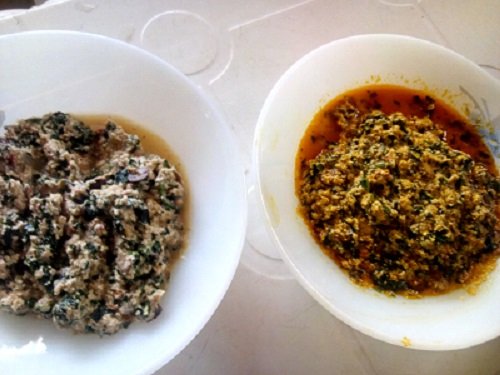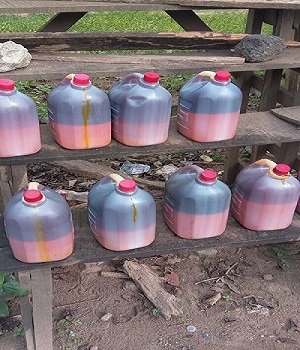Palm oil: the controversial oil
Introduction
Growing up in the western part of Nigeria, we were brought up knowing palm oil (also known as red palm oil) to be the main cooking or edible oil used in most homes. We used it in cooking different kinds of soup and stew especially due to the flavor and colour it adds.
Some use it as local ketchup with roasted plantain, cooked or roasted yam. It was widely preferred to vegetable oil because it was cheaper (still is), locally available and thought to be healthier. Hence I also became a consistent user of red palm oil until the day I went for a health seminar where we were told that palm oil is not good for the body and should be discontinued in usage. Most of the women there that day were not comfortable with this counsel. In fact some men also said they couldn’t imagine their wives cooking some soup like melon soup (see image) without red palm oil.
We were a confused audience. Some even declared that they preferred to take yam with red oil rather than yam with fried egg. We had been brought up to belief that palm oil had a lot of health benefits even more than vegetable oil. My mum and son usually run stool after taking food made with only vegetable oil. So, after the seminar, I decided to do some review of literature on this controversial oil.
Palm oil
Palm oil is semi-solid at room temperature with melting point at 35°C. It is derived from the oil palm fruit of the Elaeis guineensis tree which is native to West and Southwest Africa.
Palm oil is locally made in Nigeria especially in the Western and Eastern part of the country. it has a reddish-orange colour and has been in use in different region of the world for as long as 5000 years.
Palm oil is 100% fat. Oh no! Can any good thing come from fat?
About Fats
Fats can be classified as good, not so good or bad fats. The good fats are the poly and mono unsaturated fats; they are liquid at room temperature. They are made up of fatty acids with one (mono) or more than one (poly) double bonds which make them unsaturated and easily broken down in the body. The polyunsaturated are the essential fatty acids (omega-3-fatty acid and omega-6-fatty acids) which the body requires for good health but could not synthesize and therefore should be ingested.
The not so good fats are the saturated fats containing saturated fatty acids containing fully bonded carbon atoms with hydrogen atoms. They are solids at room temperature and could be detrimental to human health. Saturated fat could drive up cholesterol level and studies have reported a link between saturated fats and heart disease. Saturated fats are still considered to be better than the trans fats which are referred to as the bad fats. The trans fats are products of hydrogenation of unsaturated oils as a way of preventing the oil from going rancid. An example of this is the hydrogenation of vegetable oils (liquid) to margarine (solid). The trans fats are the worst type of dietary fats.
Bad news: Palm oil as a foe
Palm oil is made of about 45-50% saturated fatty acid in the form of palmitic acid; CH3(CH2)14COOH. Studies have shown conflicting results about effect of palm oil on cholesterol level in the body. Some reported that palm oil can decrease cholesterol level in some individuals, while other reports indicated an increase in cholesterol concentrations for some individuals after ingesting palm oil. Moreover, it should be noted that processed or oxidized palm oil has reduced antioxidant properties and therefore could be harmful to health. Therefore it is advised to use unrefined and cold-pressed palm oil.
There are also some concerns over the environmental impacts of palm oil production. Due to increase in the demand for palm oil in some countries like Malaysia and Indonesia the tropical forests are being deforested to accommodate oil palm plantation. This could be devastating for wildlife and disrupt the ecosystem. Moreover, it could also result in the upshot of greenhouse gases. The evidence of this environmental impact of oil palm plantation eroding tropical forest is shown in a caption i took on driving through some areas in Western Nigeria where thick forest is been replaced with oil palm plantation (see image).
Good news: Palm oil as a friend
Palm oil contains both saturated and unsaturated fatty acids. Though the larger portion is made of saturated fatty acids (45-50%), it consists of about 36-41% monounsaturated fatty acids and 8-11% of polyunsaturated fatty acids which are the good fats. Moreover, palm oil contains about 33mg/100g of Vitamin E (tocotrienols), which supports brain function. This would enhance cognitive development and reduce the risk of dementia. Moreover, the orange red color of palm is as a result of the presence of antioxidants known as carotenoids including beta-carotene which the body converts to Vitamin A. Various studies have reported palm oil has been reported to have the following benefits:
- Reduces Cholesterol Levels (conflicting reports)
- Slows the Progression of Heart Disease (tocotrienols)
- Boosts Brain Health (tocotrienols)
- Enhances Vitamin A Status (needed for healthy vision and immune function)
- Reduces Oxidative Stress (due to the presence of antioxidants)
- Improves Skin and Hair Health (Vitamin E)
Palm oil has also been widely used in Africa for medicinal purposes like antidote for poison, in treatment of skin infections and so on. I remember a time when my dogs were losing hair, the Vet doctor advised me to add palm oil to their daily ration. I have been doing that since the past four years and it’s been highly effective in preserving their hair.
.
What to do?
In the light of the benefits and uses of palm oil (especially in Africa), one can’t advocate for elimination of palm oil in diets. However, the following points should be considered in its consumption:
- It is better to consume raw unprocessed or un-oxidized palm oil.
- In fractionated palm oil, the top liquid layer contains most of the unsaturated fatty acids while the bottom semi-solid retains the saturated fats. So, consume more of the liquid top layer.
- Palm oil should not be more than 10% of total calorie consumption
- Palm oil should not be consumed after repeated heating
- Countries should use the lands that are not tropical forests for oil palm plantation. Available lands which have not been used for greenery could be transformed into oil palm plantation without destroying the ecosystem of tropical forests.
Hun! Is that a sigh of relief? Yes, I believe we can still use our palm oil moderately for the various purposes including as -
cooking oil in our soups and stews having brought to bear the points outlined.
Thank you for stopping by.
References
- https://www.healthline.com/nutrition/palm-oil
- http://www.onegreenplanet.org/vegan-food/is-palm-oil-good-for-your-health/
- https://www.health.harvard.edu/newsletter_article/By_the_way_doctor_Is_palm_oil_good_for_you
- https://draxe.com/red-palm-oil/
- https://en.wikipedia.org/wiki/Essential_fatty_acid
- https://en.wikipedia.org/wiki/Fatty_acid
- https://www.health.harvard.edu/staying-healthy/the-truth-about-fats-bad-and-good

)
)


God bless you. @biblegateway
Thank you ma for this educative post. Like you rightly noted, the southwestern Nigerian are accustomed to cooking with palm oil and it may be a herculean task asking them to stop it usage. Thank God, they don't have to. They only have to follow the guidelines given here for it usage and they are pretty simple.
yes. there raw unprocessed palm oil is not as bad as we've been made tp believe. its the refined and over-heated ones which pose as health foes.
thanks for taking time to read the post.
Congratulations @conas! You have completed some achievement on Steemit and have been rewarded with new badge(s) :
Click on the badge to view your Board of Honor.
If you no longer want to receive notifications, reply to this comment with the word
STOPTo support your work, I also upvoted your post!
Do not miss the last post from @steemitboard!
Participate in the SteemitBoard World Cup Contest!
Collect World Cup badges and win free SBD
Support the Gold Sponsors of the contest: @lukestokes
It looks like every food rich in beta-carotene all tend to have that reddish-yellow or yellowish colour. For example the palm oil, apricot, carrot, sweet potatoes, etc.
I still prefer the palm oil, in some food, to its over-proceeded neighbour- the vegetable oil.
yes,that's true, the carotenoids are responsible for those coloration in plants you mentioned and they are good anti-oxidants too.
thanks for visiting.
You are welcome.
Living in a country that has many palm oil plantation has certainly made me so interested with your post. I have always wondered the benefits and the bad effects of palm oil and you've explained it quite clearly here. I guess the key is to take it in moderation. Thanks for the write up :)
Thanks , there have been so m,any myth surrounding palm oil, but if one takes the good part , one enjoys the benefits.
Thanks @conas for writing about palm oil, My favourite of the delicacies mentioned is the yam with palm oil and I have never taught of the health implication; however thank God that I 've been doing the right thing by consuming the upper layer.
Thanks @ugonma , its really a delicacy, i prefer it to fried eggs. if we can take more of the of the liquid portion and abstaain from repeated heating, we would enjoy the benefits with reduced constraints.
I must first confess that your first pic attracted me.
Palm oil has been a part of our lifestyle and culture here in Nigerian and i doubt that we are willing to let it go. I personally would go for palm oil against vegetable oil all because of the taste.
I used to hear that heating palm oil vwry well would help reduce the "bad fat" content. well, i guess thats wrong.
Thanks for educating me
@rharphelle, you must be a fan of 'egusi soup' then, can't imagine pounded yam without it, or 'egusi soup' without palm oil. Thanks for stopping by.
Hi @conas!
Your post was upvoted by utopian.io in cooperation with steemstem - supporting knowledge, innovation and technological advancement on the Steem Blockchain.
Contribute to Open Source with utopian.io
Learn how to contribute on our website and join the new open source economy.
Want to chat? Join the Utopian Community on Discord https://discord.gg/h52nFrV
Hy @conas, personally, I love palm oil to the extent that even when i'm supposed to use groundnut oil... I would rather use palm oil. You just increased that love...lols...
Very informative and educative post. Steem on!!!
Thanks, but do all in moderation o.
Lol... Of course😀👍
Thanks, @conas for this informative post. I can't eat white soup oo, i like red oil.